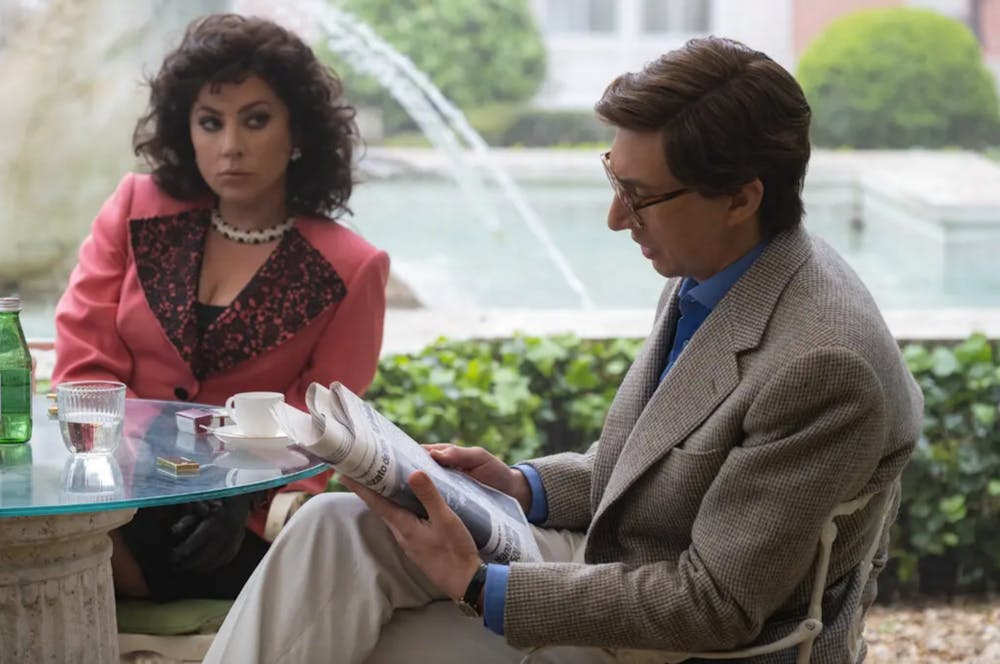It’s not every day you see a movie whose main selling point is how much its subjects hate it.
Throughout the latter half of 2021, “House of Gucci” has been an enduring presence in the news, but not because of its plot or its critical reception — rather, because of the slapfight it’s caused between the real-life Gucci family and director Ridley Scott.
Months ago, as “House of Gucci”’s first trailers began to appear in theatres, the Gucci family released a statement through the Italian news agency ANSA denouncing the film as “anything but accurate” and a shameless attempt to “steal the identity of a family to make a profit”. Scott fired back, saying the family’s claims were “alarmingly insulting” and that they “should be so f***ing lucky” to be portrayed by his star-studded cast. The mudslinging, which has lasted through the film’s Nov. 24 theatrical release and beyond, seems unlikely to come to an end anytime soon; the Gucci family has even threatened to take legal action over it.
The controversy has been a silver lining that’s enticed many viewers to give the film a try. But behind its veil of social media scandal, does “House of Gucci” hold up as a creative work?
Regardless of whether it’s technically well-executed, it’s undeniably fun. Its storyline, which follows Patrizia Reggiani (Lady Gaga) as she marries into the wildly wealthy Gucci family and wrests control of it from the inside, is full of wacky twists and turns that’ll leave your head spinning. Gaga and her fellow cast members (especially Al Pacino as Patrizia’s conniving uncle-in-law Aldo Gucci and Jared Leto as family black sheep Paolo Gucci) seize every available opportunity to chew the scenery; for the most part, they pull it off. Their antics, set to a peppy “best of the ‘80s” soundtrack, take place amidst gorgeous scenery and are captured by some seriously top-notch cinematography.
It’s an enjoyable watch — but a fun film isn’t necessarily a well-made one. At a lengthy two and a half hours, “House of Gucci” feels bloated, full of darlings that Ridley Scott couldn’t bear to kill. Many scenes do essentially nothing to further the main plot, giving the impression they were only left in to let the cast flex their (admittedly talented) acting muscles at each other. The main plot itself unravels if you stare at it for too long: it’s too full of plot holes and too devoid of any reasons to care about the Gucci family’s ultimate fate.
The film’s biggest problem, though, is best summarized by Tom Ford, Gucci’s former creative director and one of the film’s more kindly-portrayed subjects. In an essay for Air Mail Magazine, he describes the eerie experience of watching his own identity onscreen, fictionalized and played by an actor, in “House of Gucci''. He has several criticisms to offer — Gaga’s accent sounding more Russian than Italian, the Gucci family’s personalities being exaggerated so much that they resemble “Saturday Night Live versions'' of themselves — but his biggest issue is the film’s indecision as to whether it wants to be dramatic or campy. “Was ‘House of Gucci’ a dramatic farce or a gripping tale of greed?” he asks. “I often laughed out loud, but was I supposed to?”
I suspect many viewers of “House of Gucci'' have asked themselves the same questions. Its acting, while excellent across the board, feels disjointed: leads Adam Driver (as Patrizia’s husband Maurizo) and Jeremy Irons (as Maurizio’s crotchety father Rodolfo) seem to think they’re in a psychological thriller, while Gaga, Leto and Pacino perform as though they’re starring in a “Monty Python”-esque satire, with all the hamminess that entails. Scenes flip-flop from somber drama to side-splitting comedy and back again in the span of minutes, leaving the viewer confused and uninvested.
If the film had stopped waffling and picked a genre, it could’ve cemented its place in history as one of the crime drama greats. As it is, it’s simply average.
But for the casual viewer, just looking for a fun time involving espionage, romance, explosions and Jared Leto in a bald cap advising someone to “never confuse shit with chocolate... trust me, I know the difference” in an over-exaggerated Italian accent? “House of Gucci” more than delivers.
Get The Chronicle straight to your inbox
Sign up for our weekly newsletter. Cancel at any time.
Jules Kourelakos is a Trinity senior and a managing editor of The Chronicle's 120th volume. She was previously Recess editor for Volume 119.

